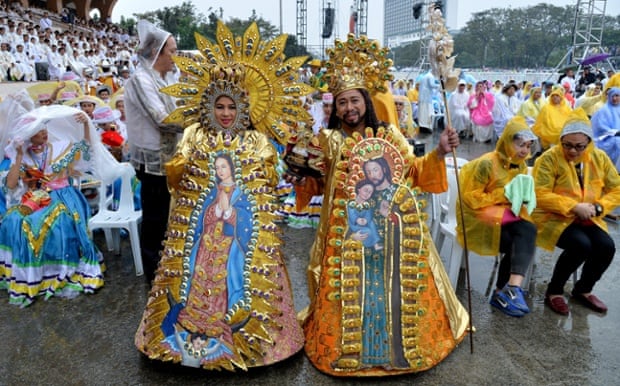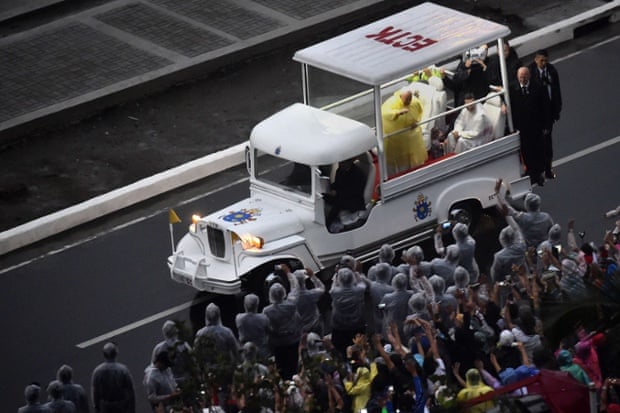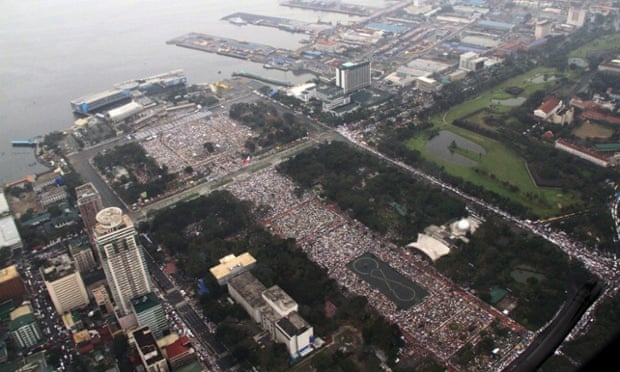by
Damien F. Mackey
-----------------------------------------------------------------------------------------------------
“The indispensable presupposition of all these” – the Pope said – “is
peace, which, even more than an end to all wars, is the fruit of heartfelt
conversion”.
ADDRESS OF HIS HOLINESS POPE FRANCIS
TO THE MEMBERS OF THE DIPLOMATIC CORPS
------------------------------------------------------------------------------------------------------
The Universal Desire for Peace
Every normal
person yearns for a life of peace and one free from constant painful dramas.
People chalk the word, ‘peace’, on footpaths, write it on walls, wear it on
their T-shirts. The word ‘peace’ has been much bandied about since the Lindt café
siege in Sydney (Australia) and the Charlie
Hebdo massacre in Paris. Former Australian
Idol winner, Wes Carr, who quickly penned a song about the Sydney siege,
I Pray, recently made this comment: “I am so deeply humbled my song I Pray has resonated
with so many ... we all need to find peace within ourselves and speak more of
LOVE and HOPE than to live in fear and anger”.
Even Man Haron Monis, the Islamic terrorist responsible for
the Lindt café siege in Sydney, was a self-professed “peace activist” who in
2011 registered with [New South Wales] Fair Trading, an association the objects
of which were: “To provide humanitarian assistance to mankind especially
children and women. To promote peace and spirituality in the society and to
encourage people to live in harmony”.
And the brother of the police officer Ahmed Merabet who was
gunned down during the Charlie Hebdo rampage, and who was Muslim, said. “Islam is a religion of peace and love”.
Thus we could all probably say, with the prophet Jeremiah (8:15):
“We looked for peace, but no good came; for a time of healing, but
behold, terror”.
Now
Pope Francis, too, has spoken masterfully about our same subject of peace in
his Angelus Address of January 2015, getting right to the nitty-gritty of this
vital matter (http://www.news.va/en/news/pope-renews-call-for-peace-at-sunday-angelus). In
the course of his address the pope would take up the theme of humankind’s
universal desire for peace: “Each person, and
every people hungers and thirsts for peace; therefore, it is necessary and
urgent to build peace!”
But what exactly is peace?
Well, according to Pope Francis’s
definition: “Peace is not only the absence of war, but
a general condition in which the human person is in harmony with himself, in
harmony with nature, and in harmony with others. This is peace”.
Obviously the
removal of all war is necessary for the attainment of peace:
First of all, to silence arms and to
extinguish the outbreaks of war remain the unavoidable conditions to begin a
journey that leads to the achievement of peace in its different aspects. I
think of conflicts that are still shedding blood in too many regions of the
planet, of tensions in families and in communities ….
But Pope Francis
then immediately moves on to identify the less obvious and more personal and
deep-seated ‘wars’, asking: “-- but in how many families, in how many communities,
in how many parishes is there war! as well as the sharp conflicts in our cities
and towns between groups of different culture, ethnic and religious
backgrounds”.
Now to the crux of it all.
The heart of the matter: Do we really know how to find
peace?
People today talk much about peace,
and light, and freedom. For instance, the massive crowd of marchers
in Paris constantly chanted “liberté” (“freedom”)
at their rally. They were only proclaiming their Voltairian rights. The Charlie Hebdo situation certainly
resonates with “Voltaire”, as according to the Wikipedia article (http://en.wikipedia.org/wiki/Voltaire):
In a 1745 letter recommending his play
Fanaticism, or Mahomet to Pope Benedict XIV, Voltaire described the founder of Islam, Muhammad as "the founder of
a false and barbarous sect" and "a false prophet." Voltaire
wrote that "Your holiness will pardon the liberty taken by one of the
lowest of the faithful, though a zealous admirer of virtue, of submitting to the
head of the true religion this performance, written in opposition to the
founder of a false and barbarous sect. To whom could I with more propriety
inscribe a satire on the cruelty and errors of a false prophet, than to the
vicar and representative of a God of truth and mercy?".[91][92] His view was modified slightly for Essai sur les
Moeurs et l'Esprit des Nations, however they remained negative.[93][94][95][96][97] In 1751, Voltaire performed his play Mohamet once
again, with great success.[98]
Whilst people today talk persistently
about the much-desired pathways to happiness in life (peace, love, freedom-liberty),
are they actually prepared to ‘walk the talk’ along these very same pathways?
Often they are not, according to
the recent assessment of Pope Francis in consideration here of “light”, and
“peace” (Angelus Address, my emphasis):
In the Gospel that we read today, Saint John says,
“In Him was life, and this life was the light of the human race; the light
shines in the darkness, and the darkness has not overcome it… The true light,
which enlightens everyone, was coming into the world” (Jn 1:4-5, 9). People speak a great deal about the light,
but they often prefer the deceptive tranquility of the dark. We speak so much
about peace, but we often resort to war, or choose complicit silence, or we do
nothing concrete to build peace.
The reason being that these
same reject the very Author of these life qualities, Jesus Christ, who - as in
the case of the first Christmas - gets completely left out in the cold
(Angelus):
In fact, St John says that "He came to what
was His own, but His own people did not accept Him" (Jn 1:11); because
"“this is the verdict, that the light -- Jesus – came into the world, but
people preferred darkness to light, because their works were evil. For everyone
who does wicked things hates the light and does not come toward the light, so
that his works might not be exposed” (Jn 3:19-20). So says the Gospel of St
John. A person's heart can reject the light and prefer the darkness, because
the light lays bare their evil works. The one who does evil hates the light;
the one who does evil hates peace.
“Jesus is ‘He who must
not be named’,” Weddell says, remembering a favourite quip of one of her close
friends; one likening the situation of Christ to that of Voldemort in the Harry
Potter films and novels.
“There’s a ‘don’t ask, don’t tell’ culture going: ‘I will never
ask you where you are in your relationship with God and you’re never going to
have to talk about it,” Weddell says.
“We’ll just pretend that topic is not even on the table; that it’s all taken
care of somehow.
“We’ll talk about things we do, about institutions and our next committee
meeting and how we’re going to organise this, and our finances, and our budget,
but we never talk about the heart of the matter.” ….
Weddell’s description, ‘He
who must not be named’, reminds me of a type of scary movie in which the
cowering inhabitants must not name, or ever speak of, an evil force lurking in the
shadows of their remote village.
At the very time of my writing this article, 
"Peace I leave
with you; My peace I give to you; not as the
world gives do I give to you. Do not let your heart be
troubled, nor let it be fearful."
"Peace I leave
with you; My peace I give to you; not as the
world gives do I give to you. Do not let your heart be
troubled, nor let it be fearful."
I was there
above in the pictures you see... you will probably only be able to see my Jews
for Jesus hat, because we were so squashed against each other that I felt like
saying, "Je suis... Sardine"! The famous slogan has been toted the
world over. "Je suis Charlie" means: "I condemn the
attack", "I am for free speech" "I want a democratic nation
at peace with all religions, thoughts and views to the exclusion of all
fanatics and fundamentalists." Jesus' statement, therefore, seems very a
propos, because he offers "Peace", but he immediately
adds "not as the world gives". In other words, what people want is
not what Jesus is offering. Jesus is not Charlie, if you will. When
He says, "My peace" His peace is not what we understand as
Peace, necessarily. Jesus used the word "Shalom". Shalom comes from
"Shalem" which means "wholeness" and "spiritual
harmony" filling every aspect of our lives…not merely "Je suis
Charlie". It is much more. It is the fullness of God's presence. ….
This article,
which seems to resonate extremely well, in part, with Pope Francis’s comments
on the matter of peace, has elicited comments such as these:
I agree 100%.....peace without Jesus is an empty peace. Repent because
Kingdom of Heavens is coming.
Jesus ....The Messiah is the solution to the worlds problems ...Pray for our
Jewish Brothers and sisters and the Christians of the Middle East who live with
terror and hate on a daily basis
Shalom
I am sad that we are so supportive of Charlie Hebdo. We oppose bullying
because of the often tragic consequences. Mocking someone's religion is
bullying. Why are we surprised at the results?
The ‘God’ of the atheists
One has to
wonder exactly to whom singer Wes Carr is praying in his song, I Pray:
There ain't no God,
That will play,
With your fear, evil and hate
There ain't no God, That will discriminate,
You can't fight hatred with hate.
….
We
are all Love
Got
to remember love
Unconditional
love
We
are all love.
….
Etc.
One is reminded to some extent of Isaiah 45:20: “They have no
knowledge who carry around the wood of their engraved image, and pray to a god
that cannot save them”.
This is the ‘wisdom’ of the world, all love and peace and happiness,
but entirely without God.
Wes is simply echoing here Beatle John Lennon’s anthem to atheism:
"Imagine"
Imagine there's no
heaven
It's easy if you try
No hell below us
Above us only sky
Imagine all the people
Living for today...
Imagine there's no countries
It isn't hard to do
Nothing to kill or die for
And no religion too
Imagine all the people
Living life in peace...
According to the Apostle
James (3:15): “Such ‘wisdom’ does not come down from
heaven but is earthly, unspiritual, demonic”.
Selective Condemnation
Rightly has,
and does, Charlie Hebdo condemn
Islamic terrorism. And rightly did the anti-terrorism crowd in Paris - some say
‘the largest in French history’ - march in protest against the barbaric massacre
of twelve people, including the editor Stéphane “Charb”
Charbonnier, other Charlie Hebdo employees, and two National Police officers.
Charlie
Hebdo partly shaped my political views as a teenager. I especially remember the
delight I felt when it called for a huge mobilisation in my hometown, Tours,
before Jean Paul II’s visit, damning the Catholic church for its position on
condom use. I remember the grace and humanism of a column it gave to Patrick
Pelloux, an ER doctor working in a poor suburb, detailing how the healthcare
system was failing the poorest among us. I remember its tireless commitment to
defending women, especially to the right to have an abortion and the right to
have a sex life without shame.
With this last statement in
mind, I think it safe to assume that Charlie
Hebdo has never ever thought to
condemn abortion, which Lord Nicholas
Windsor has rightly described as a terrorism even greater than the Islamic one.
Abortion, which Windsor nails as “the single most grievous moral deficit in
contemporary life”, is discussed here particularly in relation to Europe (http://www.orthodoxytoday.org/blog/2010/12/abortion-greater-threat-to-europe-):
Abortion Greater Threat to
Europe than Islamic Terrorism
Legal abortion is “the
single most grievous moral deficit in contemporary life” and its proliferation
will exact an as-yet unknown social price for the countries that have adopted
it, said Lord Nicholas Windsor, the son of the Duke and Duchess of Kent, this
month.
“The granting to ourselves
of the right wantonly to kill, each year, millions of our offspring at the
beginning of their lives: This is the question of questions for Europe,” he
said.
“The practice of abortion
is a mortal wound in Europe’s heart, in the center of Hellenic and
Judeo-Christian culture.”
With legal abortion all but
ubiquitous, Lord Windsor wrote in the U.S. religious journal First Things,
mothers have the power of the emperor’s over the lives of their children:
“Caesar’s thumb is up, or Caesar’s thumb is down. And when it comes to
exporting this idea, we do it with zeal and determination through such institutions
as the United Nations and the European Union.”
He asks what the ultimate
cost to a society that has “placed this fearful act at its center – consciously
approving, even celebrating, its own most egregious moral failing” will be.
The great irony, he said,
is that Europe’s highly “rights” conscious political and social atmosphere, “is
in favor of one of the gravest and most egregious abuses of human rights that
human society has ever tolerated.”
“Didn’t Europeans think
they could never and must never kill again on an industrial scale?”
Lord Windsor points to the
reduction of poverty in the 1st world, the growth of women’s and minority
rights, the end of colonialism and the relatively peaceful end to the Cold War,
but says the threat of abortion has “taken us unawares” and overshadowed these
accomplishments. Even the threat of Islamist terrorism does not qualify as so
deep an “existential” threat as abortion.
“All else that we concern
ourselves with in the lives of human beings derives from the inescapable fact
that first we must have human lives with which to concern ourselves.” In
disregarding the right of the unborn to be born, he said, “humanity’s deepest
instincts are trampled and shattered.”
Windsor compared abortion
to slavery as a great moral and social evil that calls for a “new abolitionism
for Europe” before it is too late. Britain’s birth rate is higher than most
European countries, but remains below replacement level at 1.9 children born
per woman. Recent statistics have shown, however, that the country has one of
the highest rates of abortion in the EU, especially among younger women.
“This is a historically
unprecedented cascade of destruction wrought on individuals: on sons,
daughters, sisters, brothers, future spouses and friends, mothers and fathers –
destroyed in the form of those to whom we owe, quite simply and certainly, the
greatest solidarity and duty of care because they are the weakest and most
dependent of our fellow humans.” ….
How can humankind even pretend to be striving for peace
whilst allowing this ‘Herodian slaughter of the innocents’ to proceed! Are we
really serious about peace, or just hypocrites? Recall John 3:20: “The one who
does evil hates the light; the one who does evil hates peace”.
This
is the whole crux of the matter.
Blasphemy
Voltaire would
be pleased. Now-deceased Charlie Hebdo
editor, Stéphane Charbonnier, had vowed that his cartoonists would keep poking
fun “until Islam is just as banal [or humdrum] as Catholicism”.
Far worse than
that, the staff of Charlie
Hebdo have horribly mocked Jesus Christ and his holy
Mother in various of their publications.
For those
interested in learning about Heaven’s fiery displeasure regarding blasphemies
against Mary, see my:
The Five First Saturdays of Our Lady of Fatima
Je ne suis pas Charlie.







